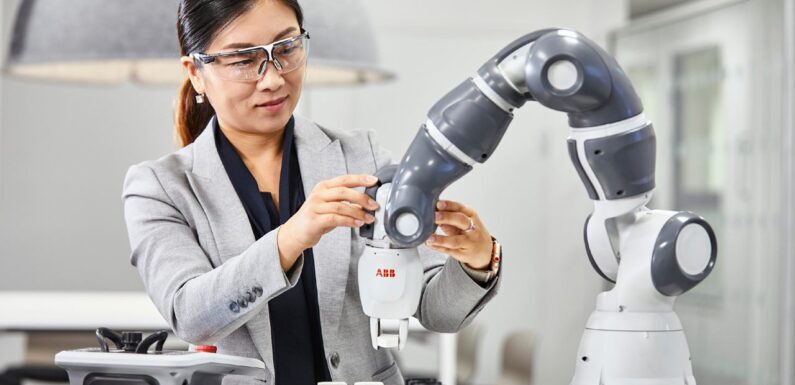
A mobile cobots (mobile collaborative robot) is a type of robot designed to work alongside human workers in a shared workspace. According to the Robotic Industries Association (RIA), industrial cobots are expected to account for over a third of the total industrial robot sales by 2027. The mobile cobots industry is highly fragmented and robotics companies are constantly engaged in research and development activities associated with mobile cobots. Some of the key companies associated with the production of mobile cobot include Yaskawa, KUKA, FANUC, Peer Robotics, Fetch Robotics, and others. Let us have a look at their developments in brief.
Top Manufacturers of Mobile Cobots and Their Developments
The Yaskawa Electric Corporation is a Japanese manufacturer of servos, motion controllers, AC motor drives, switches, and industrial robots. Yaskawa has always provided support to the leading business across the ages by transforming from “a motor manufacturer” and “an automation company” to “a MECHATRONICS company” with the help of its management philosophy and the performance of its business.
In February 2022, Yaskawa launched two new collaborative robots, HC10DTP and HC20DTP, for industrial applications. The HC10DTP and HC20DTP enable humans to work safely with robots. With the launch of collaborative robots, a variety of tasks including assembly, dispensing, machine tending, material handling, packaging, and welding can be executed easily..
KUKA is a German manufacturer of industrial robots and systems for factory automation. It offers different products ranging from robots and cells to fully-automated systems to its customers. This company also provides automation solutions for a wide range of industries such as automotive, aerospace, food and beverage, logistics, electronics, consumer goods, e-commerce/retail, and healthcare.
In August 2022, KUKA launched LBR iisy cobot. With six axes, a 3-kg payload, 600-mm maximum reach, and 18.8-kg overall weight, the LBR iisy is well-suited for overcoming the challenges posed by confined workspaces. This cobot can easily integrate into any manufacturing applications such as pre-defined production processes and increase the efficiency of the workers in the manufacturing processes.
FANUC is the world’s leading supplier of automation for manufacturing including robotics, CNCs and motion control, and ROBOMACHINE machining centres. In March 2022, Fanuc Corporation introduced three new models to its CRX line of collaborative robot arms, CRX-5iA, CRX-20iA/L, and CRX-25iA. The latest additions to its popular CRX series include the CRX-10iA and CRX-10iA/L. CRX cobots are designed for small and large manufacturers to expand their capabilities and overcome labour issues.
Peer Robotics is a collaborative mobile robotics company that develops material-handling solutions for manufacturing industries. This company delivers human-centric and adaptable mobile robots for efficient material movement in warehousing, manufacturing, and assembly lines. In October 2020, Peer Robotics developed a collaborative autonomous robot for warehouse automation and material handling in manufacturing facilities. This robot can seamlessly navigate through complex environments without any change in the existing infrastructure.
Fetch Robotics offers a wide range of warehouse robots to enable automation in manufacturing and warehousing operations. In August 2021, Fetch Robotics partnered with Lucas Systems to develop the next generation of smart warehouses. The partnership helped to optimize the collaboration between warehouse workers and cobots.
Opportunities in Mobile Cobots Industry
The development of the Industry 5.0 is expected to create ample growth opportunities for the mobile cobots industry. Industry 5.0 integrates humans and machines such as cobots to increase overall industrial production efficiency. A shift from robots to cobots is taking place in Industry 5.0 and enabling robots to collaborate with human workers at the centre of the manufacturing process. The introduction of faster, smaller, and more flexible cobots has accelerated the development of Industry 5.0.
Also, new mobile cobots with a payload capacity of up to five times the existing ones are embedded with robotic grippers to perform applications such as packaging, heavy machine tending, and material handling in different industries.
Impact of Mobile Cobots
Mobile cobots are having a significant impact on various industries, including manufacturing, logistics, retail, and healthcare. These cobots are designed to work collaboratively with human workers, allowing a more efficient and productive workflow. By automating repetitive tasks and handling heavy loads, mobile cobots enable workers to focus on higher-level tasks that require human expertise and creativity. Thus, mobile cobots can help improve the overall quality of products and services which is critical in manufacturing industries.
Conclusion
It can be concluded that mobile cobots can change the landscape in various industries by automating several tasks with high efficiency. It also comes with safety features that enable them to work alongside humans. In 2021, the worldwide mobile cobots market size was valued at USD 6 Billion and is expected to grow at an incredible CAGR of 30.7%, according to Next Move Strategy Consulting.
Several companies such as FANUC, KUKA, Yaskawa and others are adopting strategies such as product launches and collaborations to maintain their dominance in the mobile cobots industry. Also, the development of the Industry 5.0 is expected to act as a future driver for the mobile cobots industry.

